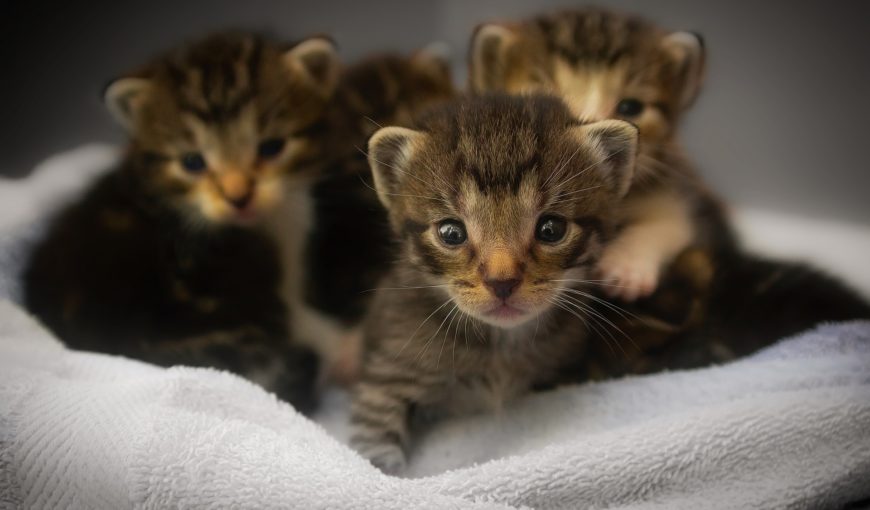Caring for Orphaned Kittens

If you find orphaned kittens, you should call the office at 824-4108 so we can assess their health and hydration status, or you should seek help at a 24-hour care facility to have them evaluated after business hours.
Unweaned kittens need around the clock care.
It is important to feed the kittens with a kitten milk replacer ONLY. Do NOT feed cow’s milk, soy or rice milk. There are several brands of kitten milk replacer available over the counter or through our office.
Always follow the instructions on the package of milk replacer for mixing and storing the product and heat the product carefully in a shallow pan of warm water. Do not use a microwave, as this can cause hot spots in the milk that can burn a kitten’s mouth or esophagus. Every brand of kitten formula will have a chart with a guide on approximately how much should be given at each feeding.
You can use a small bottle sold for the purpose, or you can use an eyedropper to feed your kittens. An eye dropper might be a little easier for very young kittens around 1-2 weeks old. When feeding a kitten, don’t feed it on its back. Instead, keep them on their tummy and tilt the bottle so the kitten does not suck air. Don’t feed too fast or force the formula—the kitten could choke.
The age of your kitten will determine how often it needs to be fed. Kittens under 1 week of age have their ears flat to their heads, their eyes are shut, and part of the umbilical cord may still be attached to the navel. Between 10 days and 14 days, the eyes begin to open, but the ears are still flat, and the kitten is smaller than a hand. At this age, from birth to 2 weeks, the kitten will need to be fed every 2 hours around the clock.
At three weeks of age, the eyes are fully open, but are blue in color. The ears have become erect, tooth buds are visible in the mouth, and the kitten is able to begin walking in a wobbly fashion. At this age the kitten should be fed every 3-4 hours.
At 4 weeks of age, the teeth erupt, and the kitten will be walking well. At this stage, a small amount of canned kitten food may be mixed in with the formula. Take care that the opening of the nipple on a bottle or that the eyedropper can accommodate this thicker diet. The kitten will still need to be fed every 4-5 hours around the clock.
When the kitten if 5-6 weeks old weaning can begin. They kitten’s eyes will change from blue to its adult color, and it is more active and playful. Small shallow dishes of canned kitten food can be offered during the day, but feedings should continue every 4-5 hours.
At 7 weeks, formula feedings can be decreased and meals of canned food can be increased. You can mix some of the formula with the canned kitten food.
At 8-9 weeks, the kitten will look like a small version of an adult cat and can be introduced to dry kitten food. The dry food can be soaked in formula to make it easier to transition.
Young kittens cannot urinate or defecate on their own until they are 3-4 weeks of age. The must be stimulated to relieve themselves after every meal. To stimulate the kitten to go, use warm damp gauze or a cloth and gently rub the anal and genital areas. The kitten should begin to go within 1-2 minutes. The urine should be a very pale yellow. Dark urine indicates dehydration or not enough formula. Stools should be brown and only partially formed. Firm or hard stools can mean the kitten is dehydrated or needs to be fed more formula.
If a kitten needs more formula, it is best to increase the number of feedings per day rather than the amount fed at each meal. Too much food at a feeding can cause bloating and gas or regurgitation. When a very young kitten regurgitates formula, there is risk of it aspirating the formula into its longs which can cause pneumonia or death.
If you cannot care for the orphaned kittens yourself, you can try to take them to a shelter. However, shelters are often overwhelmed by the sheer numbers of kittens bought to them during kitten season, and they may not have space or enough fosters to take in any more kittens.
If the shelter you have contacted does not have room, please do not leave kittens outside the doors of the shelter or in parking lots. The kittens could die of exposure, or could be killed by stray animals or wildlife. There can also be legal ramifications for abandoning animals.
Unfortunately, veterinary hospitals, including ours, are not equipped to act as animal shelters. In the event a shelter cannot accept your kittens, do ask them for other resources or alternatives. They often know people who foster for you or guide you to different rescues or other organizations who may be able to help you and the kittens you have saved.
If you can raise the kittens yourself, they will be ready for their first vaccines, a Feline Leukemia/AIDS test, and deworming at 8 weeks of age, and you may begin looking for homes for them.





